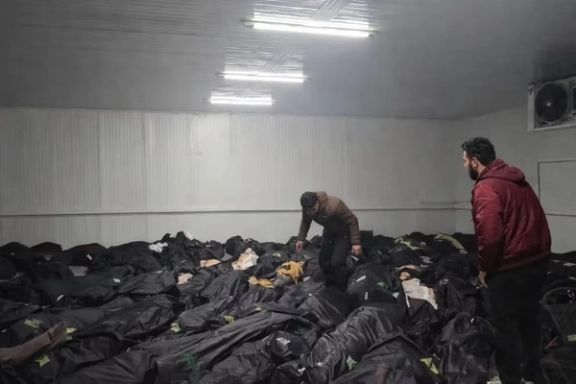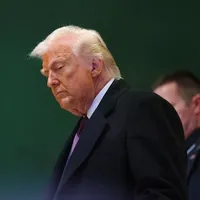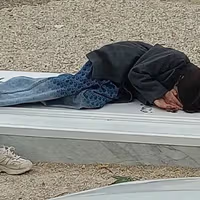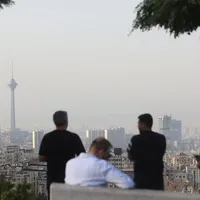At a virtual event hosted by CIJA, the Centre for Israel and Jewish Affairs, diplomats, lawmakers and rights advocates marked the anniversary and criticized Tehran.
“That morning I lost three friends of mine... Nunca lo voy a olvidar. I will never forget them,” said Nico Slobinsky, a Jewish Argentine Canadian and survivor of the attack.
“I still remember... and I shake a little bit when I talk about this,” he added.
The 1994 AMIA bombing, which killed 85 and wounded more than 300, remains the deadliest attack in the country's history. An Argentinian prosecutor ordered ten people including several Iranians to stand trial for the attack last month.
Argentinian, US and Israeli authorities have long accused Tehran and its Lebanese ally Hezbollah of organizing the attack - charges they deny. Iran on Friday again rejected accusations it was involved and urged a search for the real killers.
Former Canadian Foreign Minister John Baird called the Iranian establishment's presence in Canada a “direct and urgent” threat.
“The life of a past elected official is under threat here in Canada today,” Baird said, referring to fellow panelist Irwin Cotler, Canada’s former Justice Minister.
Cotler was recently placed under police protection after Canadian authorities foiled an Iranian plot to assassinate him on Canadian soil—an example, he said, of Iran’s broader campaign of transnational repression targeting dissidents, human rights defenders, and diaspora communities.
A 2023 Global News investigation uncovered more than 700 Islamic Republic-linked associates operating on Canadian soil.
In June 2024, the Canadian government designated Iran’s Islamic Revolutionary Guard Corps (IRGC) a terrorist group—a move some critics say came too late, especially after the IRGC shot down a passenger plane over Tehran in January 2020, killing dozens of Canadians with two surface-to-air missiles.
“We cannot forget as we remember tragedy ... we cannot ignore today the massive domestic repression in Iran, which is intensifying as we meet, and which conflates with the transnational repression and assassination,” Cotler said.
"They're not separate issues. There is a nexus between the two, and both regrettably mandate us to combat the culture of impunity.”
'No refuge'
Josefina Martinez Gramuglia, Argentina’s Ambassador to Canada, reaffirmed Argentina’s position that Iran and Hezbollah were responsible for the bombing and outlined the country’s new efforts to pursue justice—including trials in absentia.
“Those who commit acts of terror will find no refuge,” said Ambassador Gramuglia.
Just weeks earlier, on June 26, Argentine federal judge Daniel Rafecas formally ordered that ten people—including several former senior Iranian officials—stand trial in absentia for their alleged roles in the bombing.
Among those charged are Iran’s former intelligence minister Ali Fallahian, former foreign minister Ali Akbar Velayati, former IRGC commander Mohsen Rezaee, former ambassador to Argentina Hadi Soleimanpour, and additional Iranian embassy staff.
The defendants are considered fugitives, many since 2003, and will be tried under a new law passed in February allowing long-term fugitives to face justice even if absent from court.
Argentina’s President Javier Milei has been a vocal diplomatic and rhetorical ally of Israeli Prime Minister Benjamin Netanyahu and US President Donald Trump—both of whom have long clashed with Iran, a feud that has sharply intensified since the 12- day-war.
Argentina, home to Latin America’s largest Jewish community, has seen its case complicated over the years by allegations of cover-ups, shifting judicial leadership, and even political interference.
Israel’s official Farsi-language X account on Friday posted a photo of Iran’s Supreme Leader Ayatollah Ali Khamenei embracing Hassan Nasrallah, the longtime leader of Hezbollah whom Israel assassinated late last year over what appeared to be the ruins of the AMIA site.
"The perpetrators of this crime: one has been dispatched to hell, and the other is hiding in an underground hell," the post said, referring to reports that Iran's Supreme Leader was transferred to a bunker during the Israeli attacks.
Iran, however, has rejected the accusations as baseless.
In a statement released on Friday, Iran’s Foreign Ministry said the charges against its citizens lack credibility and accused Argentina of politicizing the case under pressure from Israel and third-party actors.
“Iran has called for the real masterminds and perpetrators of the explosion to be identified,” the statement read, adding that the Islamic Republic reserves the right to respond to “any inappropriate and unreasonable action” taken against its citizens.
Iran's ministry also criticized what it called a “show trial,” and urged Argentina to uphold principles of transparency, fairness, and independence in its judicial proceedings.
While Tehran continues to deny involvement, the panelists at the CIJA event argued that justice—though delayed—must not be denied.
For them, the AMIA bombing is more than a tragic memory. It is a warning about the enduring threat posed by the Iranian government—one they say must be confronted, in courtrooms, in policy, and in public awareness.



















